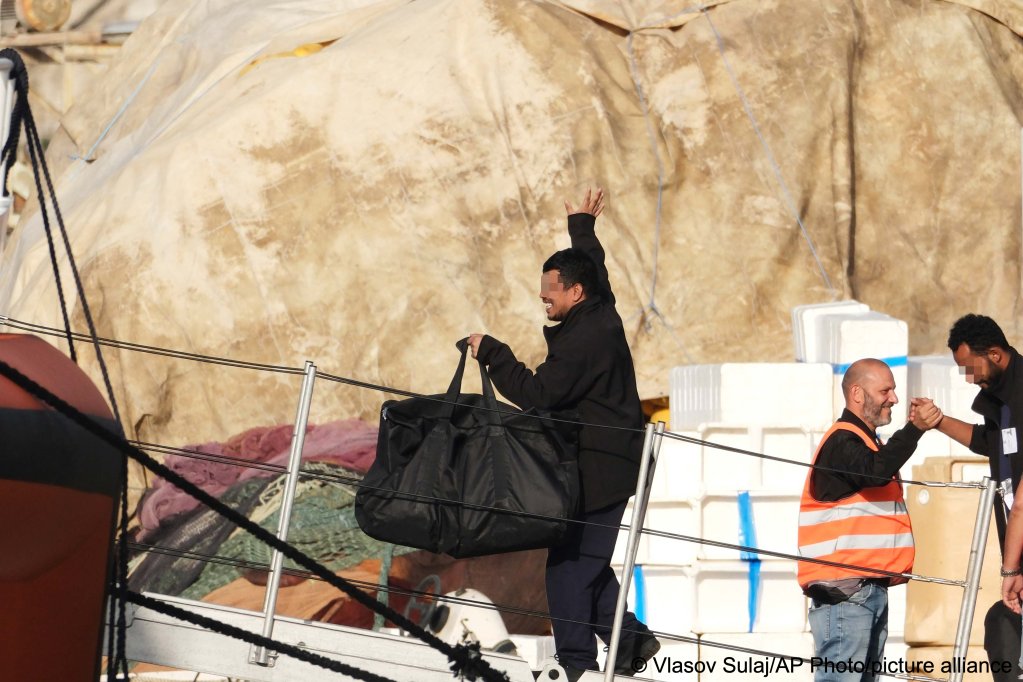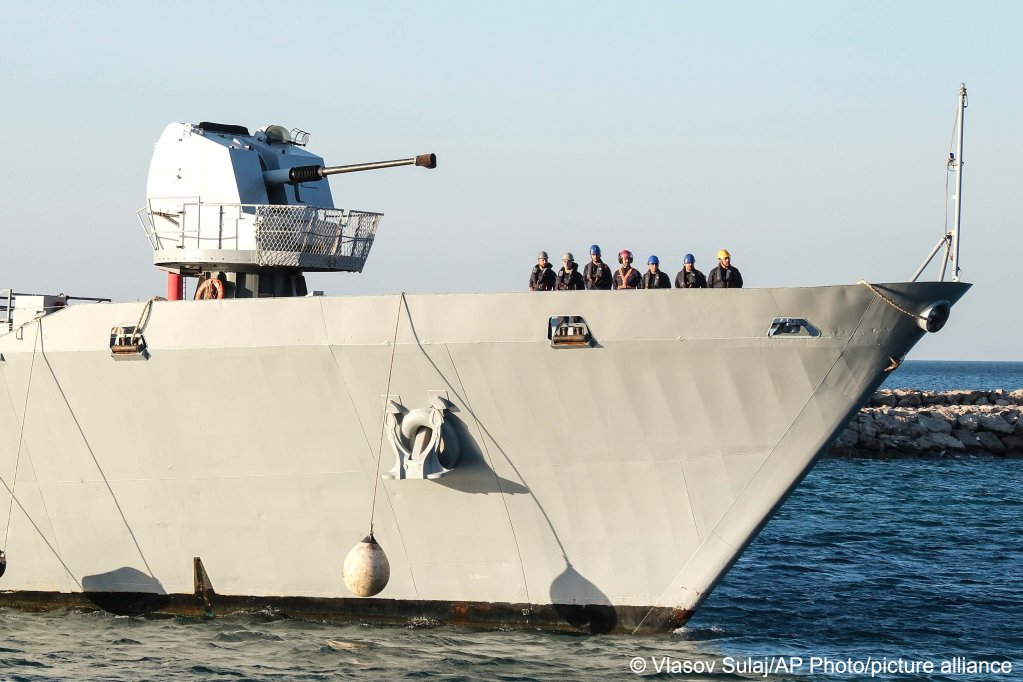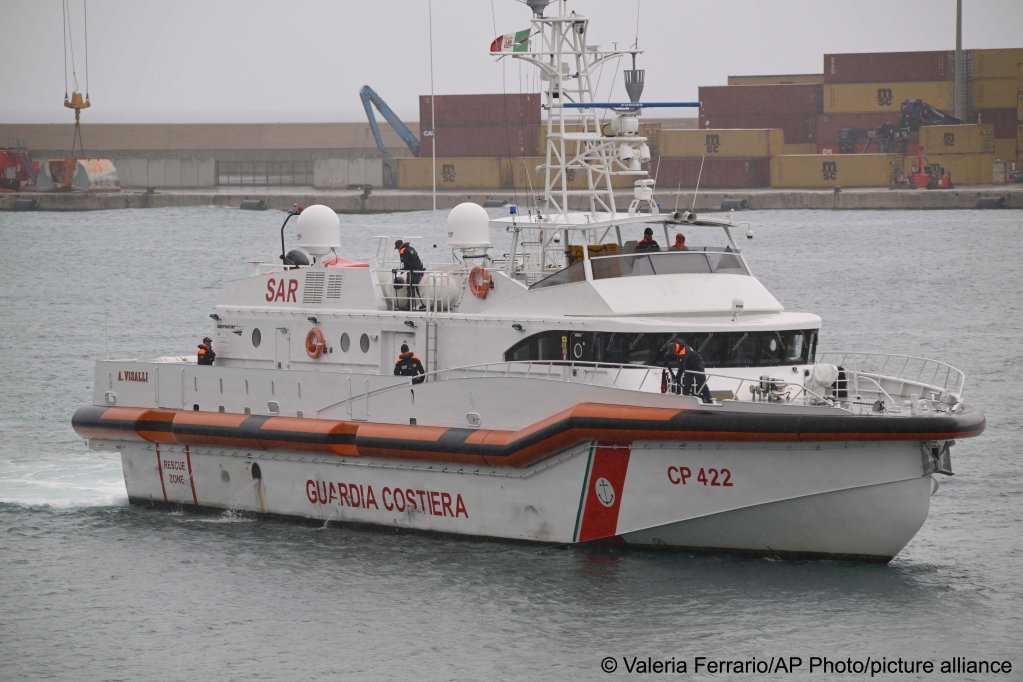Italy’s government approved a new decree on Monday aimed at overcoming the blocks that have been put in the way of its Albania plan to outsource asylum procedures by a recent court decision.
The Italian government approved a new decree late on Monday (October 21) during a cabinet meeting, aimed at overcoming some of the blocks that a court ruling put in the way of its Albania plan late last week.
The new decree is effective immediately and enshrines in law the government’s definition of ‘safe’ countries, reports the news agency AP. The law would still need to be approved by the Italian parliament, but the government currently has a majority, so this shouldn’t be a problem.
The decree came about during a heated debate in Italy, after an email from a judge was leaked in a national newspaper on Sunday, prompting tit-for-tat arguments between the judiciary and politicians.
Read AlsoCourt nixes detention of migrants taken to Albania
New decree redefines 'safe countries'
One aspect of the new decree is to reduce the list of countries considered "safe" from 22 to 19. Cameroon, Colombia and Nigeria have now been excluded from the list of so-called "safe" countries. Egypt and Bangladesh however remain. The new decree means that the Italian government has designated all parts of each 'safe' country safe, disregarding any caveats they have in their current directives, reported the French news agency Agence France Presse (AFP).
The Italian justice minister Carlo Nordio told the Italian newspaper La Republicca on Monday that "the definition of what is a safe country can't be left to the judiciary to decide, because it is about a political evaluation, and obviously within the parameters of international law."
Nordio added that "in my ideal world, judges should not criticize laws and politicians should not criticize trials, but they [the judiciary] started it." Nordio continued that in his opinion the judges had "misinterpreted" European law, and that a "good judge should understand the limit of his competences."
Rome tribunal decision
On Friday, an Italian migration tribunal in Rome declared that a group of 12 migrants from Egypt and Bangladesh, who had been shipped to Albania to have their asylum claims processed, should be sent back to Italy because their countries of origin could not be considered safe.
Originally, a group of 16 migrants was sent to Albania last week, but shortly after they arrived, it transpired that two claimed to be minors and two of them were ill, and so they were promptly sent back to Italy. Just a couple of days after their arrival, the whole group of migrants was returned to Italy.

Judges at the tribunal cited the European Court of Justice ruling as a motivation for their decision. The ECJ ruling indicated that a country can be deemed safe for migrants’ repatriation only if its entire territory can be considered safe.
Read AlsoFour migrants sent back to Italy from Albania
A faltering model?
Italy’s deal with Albania was touted last week at the summit of European leaders by Prime Minister Giorgia Meloni as a possible future model for other EU countries to follow. European Commission President Ursula von der Leyen expressed admiration for the idea, and other leaders, including the UK’s Prime Minister Sir Keir Starmer, were keen to find out more.
But just days after the centers were inaugurated, the first tiny group of migrants could not be processed as hoped.
When the centers are fully operational, Italy has said it hopes to process thousands of migrants there each month. The deal is set to run initially for five years with Albania, and Italy has promised hundreds of millions of euros to fund it.
However, even by Italy’s own rules it might be difficult to meet its own targets. Under the rules of the centers, only non-vulnerable men who were picked up by the Italian rescue services in international waters can be sent there, which is not the majority of migrants arriving in Italy.
Meloni: The government decides
Meloni and her government attacked the tribunal’s ruling last week, saying that the magistrates were in league with the left and that they would overcome any obstacle thrown at them. Meloni said, reported AFP, that the tribunal’s ruling was "prejudiced."
Meloni said she would make sure she would "approve laws to overcome this obstacle, because I don’t think it’s up to the judges to say which countries are safe, but the government."

Legal experts however point out that EU legal rulings take precedence over conflicting national laws, and so the Italian government might find it harder than they think to make the centers effectively pay in the way they hope, reports AP.
Italy’s Interior Minister Matteo Piantedosi said on Monday that the new decree was in line with the ECJ’s ruling and in accordance with the new EU Pact on asylum and migration that will become effective in 2026.
Read AlsoAlbania: First asylum seekers arrive under Italy deal
Following in the footsteps of Rwanda?
However, in trying to pass a law to declare something safe when others might have ruled otherwise, the latest Italian attempts have echoes of Britain’s former Conservative government’s attempts to declare Rwanda a ‘safe’ country and make their Rwanda plan, on which they also spent millions, effective. Eventually, after more than two years of legal battles, the Rwanda plan was declared dead by Britain’s incoming Labour government.
An Italian immigration lawyer, Guido Savio, told AFP that the sudden change in Italian law could also lead to new legal challenges.
Britain's Rwanda plan also suffered from several European court judgments, as well as rulings from its own high court which said that Rwanda should not be considered a safe country for all to be sent.
Politicians vs judiciary
On Sunday, Meloni shared on her X page quotes from a letter written by an Italian magistrate. In it, the magistrate warned that Meloni is "much more dangerous" than Silvio Berlusconi, and called on fellow magistrates to tackle this situation.
An article with quotes from the email was published in Il Tempo newspaper on Sunday and was based on a leaked email that is reported to have been written by a judge, Marco Patarnello, to fellow judges, many of whom are part of a group called Magistratura Democratica (Democratic Magistrates), which advocates for upholding democratic principles and minority rights. The group's president, Silvia Albano, is a judge involved in the ruling on Italy’s Albania asylum plan.

In a press release published on its page, Magistratura Democratica denied that the mail in question was "part of a plot to overturn the government," saying that "anyone that was planning a plot would not have sent a mail out to the whole magistrate’s mailing list, with the knowledge that lots of people have access to that list, and could pass the contents to journalists."
Read AlsoWhat is the Italy-Albania deal on migration?
'A series of discussions, necessary in a democracy'
According to Magistratura Democratica, the mail was meant to emphasize to magistrates that they should not be practicing political opposition, but instead should "bring clarity to issues that could compromise the rights of citizens."
"Seen in this light, which is the reality of the situation, the email that has solicited such extreme reactions was just meant to call for a public discussion of the issues, which in a constitutional democracy is necessary."
Meloni’s response, however, was to turn what was meant as criticisms of her strategy into accolades to her character. Writing on X and quoting from the email, she emphasized that because she has no current trials or investigations against her, "she is not doing anything for personal interest," but out of "political conviction" and that makes her "much stronger," than anyone else.
Two years after being sworn into her office as Prime Minister, Meloni posted on X saying she was going to continue "going forward without fear." In another post on Monday morning, Meloni said: "As long as we have the support of our citizens, we will continue to work with determination, heads held high, to put in place our promised program, and help Italy to grow, become strong, credible and respected. We owe that to Italians, to those who voted for us and to those who may not have voted for us. I hope they all think we are doing a good job. Let's get going, with no let up."
With AP, AFP and Reuters
